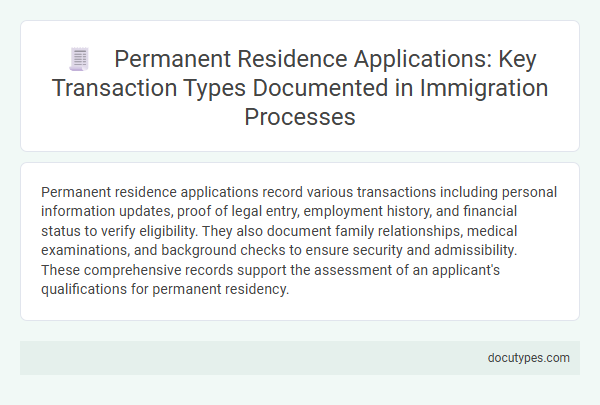Permanent residence applications record various transactions including personal information updates, proof of legal entry, employment history, and financial status to verify eligibility. They also document family relationships, medical examinations, and background checks to ensure security and admissibility. These comprehensive records support the assessment of an applicant's qualifications for permanent residency.
Overview of Permanent Residence Applications
Permanent residence applications document a variety of transactions related to an individual's immigration status. These records provide detailed information to ensure eligibility and compliance with immigration laws.
- Personal Information Collection - Applications gather biographical details such as name, date of birth, nationality, and family composition.
- Employment and Education History - Records include work experience and academic qualifications supporting the applicant's eligibility.
- Medical and Security Checks - Health screenings and background verifications are documented to assess admissibility and risk factors.
Key Transaction Types in Immigration Documentation
Permanent residence applications record key transactions such as entry declarations, visa status updates, and biometrics submissions. These transactions establish an applicant's eligibility, track changes in immigration status, and verify identity. Accurate documentation of these transactions ensures compliance with immigration laws and supports efficient processing.
Employment-Based Permanent Residence Transactions
Employment-based permanent residence applications record specific transactions related to job offers, employer sponsorship, and eligibility verification. These transactions ensure compliance with immigration laws and validate the applicant's qualifications for permanent residency.
- Job Offer Documentation - Records the employer's formal offer of permanent employment to the applicant.
- Labor Certification Process - Documents the employer's approval from the Department of Labor confirming no qualified U.S. workers are available for the position.
- Eligibility and Background Checks - Includes verification of the applicant's qualifications, work experience, and security screening results.
Family-Sponsored Residency Application Processes
Permanent residence applications under family-sponsored categories typically record transactions related to sponsorship agreements, proof of familial relationships, and financial support commitments. These documents establish the basis for eligibility and demonstrate the sponsor's ability to support the applicant.
Recorded transactions also include submission of biometrics, medical examinations, and background checks to verify identity and admissibility. Your application process may involve updates or additional evidence requests that are systematically documented throughout the review period.
Investment and Entrepreneur Immigration Transactions
Permanent residence applications record various transactions, especially in investment and entrepreneur immigration categories. These transactions demonstrate the applicant's financial commitment and business involvement within the host country.
- Investment Capital Transfer - Documentation of funds transferred into approved investment accounts or government-designated funds.
- Business Ownership Evidence - Records proving ownership or substantial shares in qualifying enterprises or startups.
- Job Creation and Economic Contribution - Reports showing employment generated and economic benefits resulting from the entrepreneurial activities.
These transaction records ensure applicants meet the financial and business criteria necessary for permanent residence eligibility.
Refugee and Humanitarian-Based Application Documentation
Permanent residence applications based on refugee and humanitarian grounds record detailed personal information, including identity documents, arrival details, and reasons for seeking protection. Supporting evidence such as affidavits, medical reports, and police clearance certificates are submitted to verify claims and ensure eligibility. The documentation also captures interviews, legal submissions, and any decisions made by immigration authorities during the assessment process.
Adjustment of Status vs Consular Processing
What types of transactions are recorded in permanent residence applications?
Permanent residence applications document key transactions such as filing Form I-485 for Adjustment of Status and submitting consular processing applications through the National Visa Center. These applications capture biometric appointments, interviews, and approval notices, reflecting the applicant's progress toward lawful permanent residence.
How does Adjustment of Status differ from Consular Processing in recorded transactions?
Adjustment of Status transactions occur within the United States, involving USCIS forms, biometric services, and local interviews. Consular Processing transactions take place at U.S. consulates abroad, including document submission, visa interviews, and issuance of immigrant visas for entry into the U.S.
Essential Supporting Documents for Residency Applications
Permanent residence applications record various types of transactions including personal identification, employment history, and financial information. Essential supporting documents verify these transactions to ensure accuracy and eligibility.
Supporting documents commonly required include birth certificates, passports, and police clearance certificates. Employment verification letters and proof of financial stability are also critical. You must gather and submit these documents to support your residency application effectively.
Common Challenges in Documenting Transactions
| Type of Transaction | Description | Common Challenges in Documentation |
|---|---|---|
| Employment History | Records of jobs held, including positions, durations, and employers. | Incomplete or inconsistent job records, lack of official letters or pay slips, and unclear employment periods. |
| Financial Transactions | Bank statements, tax returns, and proof of income demonstrating financial stability. | Missing statements, discrepancies between reported income and bank deposits, and untranslated documents. |
| Property Ownership | Deeds, titles, and purchase agreements related to real estate ownership. | Failure to provide notarized copies, outdated records, or unclear property descriptions. |
| Educational Credentials | Transcripts, diplomas, and certificates proving academic qualifications. | Uncertified copies, missing translations, or unverifiable institutions. |
| Legal Transactions | Contracts, affidavits, and other legal documents supporting personal history. | Incomplete documents, absence of signatures, or lack of proper authentication. |
| Personal Identification Records | Passports, birth certificates, marriage certificates, and other identification papers. | Expired IDs, discrepancies across documents, or missing certified translations. |
| Travel History | Entry and exit stamps, visas, and travel itineraries showing movement between countries. | Incomplete passport pages, undocumented trips, or conflicting travel dates. |
Careful attention to detail in documenting these transactions enhances the success of your permanent residence application.
What Types of Transactions Are Recorded in Permanent Residence Applications? Infographic

